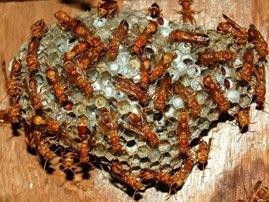
- Select a language for the TTS:
- UK English Female
- UK English Male
- US English Female
- US English Male
- Australian Female
- Australian Male
- Language selected: (auto detect) - EN
Play all audios:
When the queen wasp of the colony dies, who takes over? Is the royal hierarchy decided beforehand or does the exit of the queen trigger the succession process? What happens if queen number
two dies or is eliminated from the colony somehow? A fascinating new piece of research inside tiny colonies of these social insects has found that there is a succession of 'cryptic heir
designates' to the queen who reveal their identity only upon the removal of the queen from their abodes. Two researchers from the Centre for Ecological Sciences at Bangalore-based
Indian Institute of Science have pried deep into the world of wasps — _Ropalidia marginata_ — to study their social order more closely. They found that there is not just one heir designate
but a long reproductive queue that takes over the role of egg-laying, successively without the sign of any conflict in the colony 1 . The most striking feature of the research is the finding
that there is a smooth switch from one queen to the next without any overt dissent or disapproval by members of the colony. "A conflict-free process of choosing a successor within a
few minutes of losing the existing leader is not very common, or at least not very commonly reported," says Alok Bang, the researcher who worked with wasp expert Raghavendra Gadagkar
for three years to understand the phenomenon. "Such a phenomenon would be evolutionarily favoured in species or places where an outsider invades the group and assumes leadership,"
he explains the evolutionary significance of the work. LOOKING FOR THE QUEEN Bang and Gadagkar, who are keenly involved in the daily lives of wasps, found early on that each wasp has a
unique personality and repertoire of traits, very similar to humans. "This made the process of observing them much more interesting and fun. I can draw a lot of parallels between their
society and ours, not just philosophically but in reality," Bang says. Reproductive division of labour is the hallmark of social insects such as ants, honey bees and termites. The
colony is differentiated into reproductive (queen/king) and non-reproductive (worker) castes. The caste of the insect is determined at the time when it emerges out of the pupa. This is
irreversible — the workers can not change their caste in adulthood. In case the queen dies, the colony has to rear a new one from the egg or early larval stage. However among _R. Marginata_
wasps, lost queens are replaced by one of the workers. In their latest experiments, the scientist duo worked with prior knowledge that upon natural loss or experimental removal of the queen,
one of the worker wasps becomes hyper-aggressive, starts showing dominance behaviour and becomes the queen — laying eggs in about a week. Bang and Gadagkar wondered what would happen if
they removed this 'potential queen'(PQ) immediately after she revealed her identity. So they sequentially removed the queen and four successive PQs immediately after they became
evident upon the removal of the previous PQ. What they found was very interesting — each time a PQ was removed, there was another ready in line to take her place. They repeated the
experiments on 19 different colonies and got the same results. THE REPRODUCTIVE QUEUE There is a reproductive queue or succession in the wasps without any overt conflict over the process of
succession, they concluded. The queuing is not random, the individuals 'know' the identity of the next successor. "We stopped after the fifth successor, but there is no reason
to believe that there are no further successors. In fact, in principle, the whole colony can be lined up in the form of a reproductive queue, right up to the last individual," Bang
told _Nature India_ . What is the deciding factor to determine the next queen? "Age decides to a significant degree the identity of the successor. The oldest individuals of the group
have the greatest chances of becoming successors," Bang says. However, age is not the perfect predictor of succession. Sometimes older individuals are bypassed by relatively younger
individuals to become successors. "The significant role of age in leading a society reminds us of the role of wisdom or experience in selection of leaders in many vertebrate societies
including humans," he adds. The experiments give an insight into the origin and maintenance of sociality in insects. Knowledge about one's position in the reproductive queue of the
colony relative to others group members' positions may help individuals to decide whether to wait to become the next queen in the current group or to leave the group and join a new
group, or to start a new group themselves. Bang says the role of age is highlighted in many societies, but mostly vertebrate societies. However, the role of age without the role of
behavioural dominance in shaping reproductive queue is quite new in insects. "This will hopefully begin comparative studies investigating inheritance of reproductive positions," he
says. The mechanisms governing reproductive succession may have less to do with taxonomic position of a species and more to do with its ecology, the duo feel.








